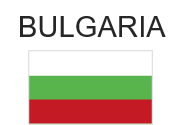The table below aims at gathering the administrative and governmental bodies of Bulgaria, which are responsible for digital public administration policies and interoperability policies.

National
By a Decision of the National Assembly of 13 December 2021, a new structure of the Council of Ministers of the Republic of Bulgaria was adopted, foreseeing the establishment of the Ministry of eGovernance.
With the subsequent amendments to the Law on eGovernment (in force since February 2022), the State eGovernment Agency for Electronic Government (SEGA) was abolished, and the Information Technology Directorate was transferred from the Ministry of Transport and Communications to the newly established Ministry of eGovernance.
The Ministry of eGovernment has taken over the powers and functions of the Chairman of the State eGovernment Agency and has incorporated the Information Technology Directorate within the Ministry of Transport and Communications. The powers under the Cybersecurity Act have also been transferred to the Minister of eGovernment.
Among the main priorities of the new Ministry are: (i) electronic identification; (ii) interoperability; (iii) digitalisation of registries; and (iv) increasing the quality of eServices for citizens and businesses.
|
Georgi Todorov Minister for Transport, Information Technology and Communications
Source: http://www.mtitc.government.bg/ |
|
Krasimir Simonski Chair of State eGovernment Agency
Source: https://e-gov.bg |
Until 2016, the Council for eGovernment assisted Ministers in the implementation of eGovernment policy, coordinated the implementation of draft sectorial eGovernment strategies and/or programmes in the context of the overall eGovernment strategy, and coordinated programme budgets and proposals for updating the overall eGovernment development strategy.
A new Electronic Governance Council, an advisory body to the SEGA, was formed in 2017, and changes were made to its functions and composition.
The government approved a Decree of the Council of Ministers establishing a new eGovernment Council. The decree regulates the composition and organization of the activities of the eGovernment Council, a body of the Council of Ministers responsible for coordinating the overall implementation of the eGovernment policy. It also defines the Council’s role within the current structure of the Council of Ministers.
The Council is chaired by the Minister of eGovernment and its members are all ministers in accordance with the decision of the National Assembly of 13 December 2021, establishing the structure of the Council of Ministers.
A Permanent Working Group is set up within the Council, with the additional possibility of setting up temporary working groups to achieve specific objectives and/or results.
The decree ensures the establishment and operation of an effective coordination mechanism for the implementation of the eGovernment policy, allowing for the views of all stakeholders to be taken into account and leading to better quality solutions for the benefit of the whole society.
The Business Council consists of representatives of organisations from the ICT sector and assists the eGovernment Council (eGovernment) in implementing eGovernment policies.
A Decision of the National Assembly of 13 December 2021 on the adoption of a structure of the Council of Ministers of the Republic of Bulgaria established the Ministry of Innovation and Growth.
The Minister of Innovation and Growth develops, organises, coordinates and supervises the implementation of the State policy in the field of innovation, technological and economic development and growth of the Republic of Bulgaria.
The Council for Administrative Reform coordinates the government policy for the general management of the State administration.
Following the provision laid down in the Cybersecurity Act, a Cybersecurity Council was established with advisory, coordination and control functions on the development and implementation of cybersecurity policies within the Council of Ministers. For the functioning of the Cybersecurity Council, a Decree of the Council of Ministers was adopted, regulating its organisation and activities.
The Cybersecurity Council assists the government in performing its cybersecurity organisation, management and control tasks, which include network and information security, cybercrime and cyberdefence.
The Council includes the Ministers for Interior, Defence, Foreign Affairs, Finance, Transport, Health, Environment, Energy, the Chief of Defence, the Secretary General of the Ministry of Interior, the President of the State Agency for National Security (SANS), the Chair of the State Intelligence Agency (SIA), the Chair of the State eGovernment Agency, the Secretary of the Cybersecurity Council within the Council of Ministers, and a representative of the President.
The Head of State, the Prime Minister and the Parliament Chair may participate in propria persona in the Cybersecurity Council. In certain cases, chairs of standing committees of the National Assembly, members of Parliament, heads of institutions and organisations may also participate.
The above-mentioned composition on one hand guarantees the necessary involvement at political level and, on the other, creates the right conditions for the Council to operate effectively.
The Cybersecurity Council holds regular meetings at least once a year, with the option of additional ad-hoc meetings. Representatives of various State bodies and of professional and civic organisations, as well as experts, may be invited to attend the Council meetings.
Pursuant the amendments to the Electronic Governance Act from February 2022, the Minister of eGovernment is the Chairman of the Cybersecurity Council.
The Geospatial Data Act regulates the structure and tasks of the Inter-Institutional Spatial Data Council. The Council includes members, appointed by executive authorities, who are primary spatial data controllers. According to the amendments to the Electronic Governance Act, published in item 15/2022 of the State Gazette, in force since 22 February 2022, the Minister of eGovernment or an authorized official is the Chair of the Council, and the Deputy Chairs are the Deputy Minister for the Environment and Waters and the Deputy Minister for Regional Development and Public Works, or their duly authorised officials. The functions and activities of the Inter-Institutional Spatial Data Council (ISDC) are regulated by the rules of procedure, structure and organisation of the ISDC. Information about the ISDC is also published on the Council of Ministers’ Advisory Councils portal. The Council is supported by an expert working group and other relevant working subgroups.
The National Computer Security Incidents Response Team (CERT)’s mission is to provide information, support and assistance to its constituencies in order to reduce the risks of computer security incidents as well as to respond to such incidents at the time of occurrence. The team maintains a database that offers information on how Bulgarian citizens and businesses can make their IT environment more secure.
The Bulgarian Institute of Public Administration was established in 2000 under the Civil Servant Act. The Institute has the status of an executive agency under the Council of Ministers of the Republic of Bulgaria and is the leading institution for the training of civil servants, including in the field of eGovernment, information and communication technologies and cybersecurity.
The Commission for Personal Data Protection is an independent State body responsible for supervising the observance of the Law for Protection of Personal Data and protecting individuals with regard to the processing of their personal data, while also providing access to these data.
A Big Data for Smart Society Institute (GATE) has been established. For a year, the Institute has been working on a pilot project for the creation of digital twins of Lozenets district in the municipality of Sofia. The GATE’s Digital Twin Lab is designed to create and demonstrate the so-called digital twins of industrial/business processes and products. The laboratory includes an intelligent platform for interdisciplinary collaboration in the development of new tools, applications and technologies for automation, production, customisation and management in the industry.
The laboratory supports research activities for digital modelling and application of digital twins, applicable to various business scenarios such as customer management, production process management, decision support. It will also actively support the development of ‘Cities of the Future’ and ‘Smart Industry’.
The Ministry of Education and Science also continues to support the development of the National Centre for High-performance and Distributed Computing under the National Research Infrastructure Roadmap. It receives annual funding for development and operational costs. The centre integrates several systems – the Avitohol Supercomputer and the high-performance grid cluster of the Institute of Information and Communication Technologies to the Bulgarian Academy of Sciences, the SU-GRID and PhysOn HPC clusters of the Sofia University St. Kliment Ohridski and the LinBladeTU cluster of the Technical University – Sofia. The systems are openly accessible for researchers and other public and private users. The centre organizes many trainings, addressed also to university students and users.
In May 2022, the Bulgarian government launched the Institute for Compute Science, Artificial Intelligence and Technology (INSAIT). The objective of INSAIT is to be a leading AI and computer science research and education institution. As defined in the National Strategic Framework for the Development of AI in Bulgaria by 2030, INSAIT focuses on scientific and technological excellence, performing research, attracting national and international academic professionals, while offering training to graduate and undergraduate students. The Bulgarian government expects INSAIT to bring forward a positive change to society and economy at large by attracting talents, preventing brain drain, creating new educational programmes, inventing high-value intellectual property (IP), and attracting technological companies as well as leading business actors.
Regions and municipalities are involved in the implementation of various eGovernment activities of local interest. More specifically, they conduct activities related to the delivery of electronic services through the horizontal eGovernment systems. These include eDelivery, ePayment, and eForms for requesting eServices. The administrations have the opportunity to join the single model for requesting, paying for and providing electronic administrative services, which is now being managed by the Ministry of eGovernance.
Local eGovernment developments are coordinated by municipalities, which are the local self-government bodies in Bulgaria. The National Association of Municipalities in the Republic of Bulgaria is the organisation that represents local authorities nationally.
Coordination and sharing activities between base registers are concluded both at central level and decentralised levels.
For some registers, data are gathered through local offices and forwarded to national registers, as is the case for the Civil Register, where data are gathered and administered through local municipal offices.
The Commission for Personal Data Protection also oversees compliance with the Law for Protection of Personal Data by the local self-government authorities.

